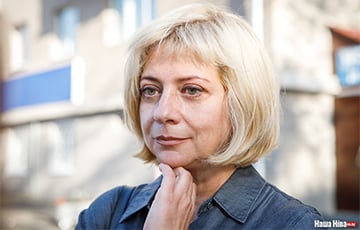Abandoned Bicycles
18- Iryna Khalip
- 6.09.2024, 17:40
- 34,666

PHOTO: NASHA NIVA
Belarusian mums and dads took their children out so that they wouldn't become orphans.
At the end of winter, I talked to documentary filmmaker Taya Zubova on the eve of the premiere of her film, ‘Territory without War’. It was a film about the Pristaniste Foundation, which was set up in Montenegro by Russians to help refugees from Ukraine. Taya shared the stories of the film's characters. At first - in the draft version of the film - only Ukrainian families were the heroes, and later Russian and Belarusian families showed up.
Taya made a very clear and tough statement. She said: ‘Ukrainian mums were taking their children out so that they wouldn't be killed. Russian mums were taking out their kids so that they would not become murderers’. She didn't say anything about Belarusian mothers, because they had started to take their children out before the war in Ukraine, before the idea of the film, before the universal, terrible, unbearable grief.
Six months later, I finally managed to formulate it myself. Belarusian mothers (and fathers, if the mother has already been imprisoned) were taking their children out so that they would not become orphans when their parents are still alive. So that they wouldn't end up in orphanages because their parents are in prison. So that they wouldn't become the first inhabitants of the camp for family members of traitors, which may well appear in Belarus.
Six months later - this is last week, when I was collecting for Novaya Gazeta for September 1 the monologues of teenagers who were forced to become refugees out of their own choice, together with their parents. Just as director Taya Zubova first filmed Ukrainians and then included Russians and Belarusians in the film, so I started with Belarusian teenagers and then spoke with Ukrainians and Russians. And I realised for the first time what a pain, what a despair, what a trauma these children carry in themselves, they no longer wait like first-graders, where their mother will take them on September 1, but make their own plans for life.
I wanted to burst into tears when Roma from Minsk was telling how on the last school day of the eighth grade, when the assembly was over and the children were just sitting and chatting, laughing, sharing their plans for the holidays and the next year. Roma was going to confess his love to his classmate that day, and then his dad called him and said: ‘I'll pick you up right now.’ And Roma understood everything. He was cycling to school and his parents knew about it. So it was a getaway. He left the bike at school. He didn't confess anything to his classmate - he didn't have time.
Roma couldn't understand why this detail about the bicycle was so important to me. I was saying: it's a symbol, it's an abandoned life, it's plans for the future, a happy future, left somewhere in the backyard. And then, after the publication, a wife of the Belarusian political prisoner wrote to me: ‘We had to leave our bicycle not even at school, but in the car park near the Palace of Youth (the child had some competition that day, either in English or Biology). And the certificate for the 9th grade remained not received (there was a month left before graduation). I still can't delete the SMS I sent to my child: ‘Daddy's been rounded up, go back home’.
And I also spoke with Lera from Kharkiv, who had lived under bomb attacks for two and a half years, and this summer her grandmother took her, sixteen years old, to Montenegro with the words ‘let me at least take my granddaughter away from this nightmare’. And there - the height of the season, fireworks and firecrackers every night, and Lera was scared as in Kharkiv. And even more scared at the thought that on the 1st of September she would have to go to a new school in a new country and study in a language she didn't know.
Then there was a conversation with Misha from Voronezh, who used to collect motorbikes in garages with the boys, and when the war started, the boys supported it and now they probably went to fight against the Ukrainians. And Misha was taken away in the middle of the school year by his parents, and he spent the whole tenth grade at home, because school enrolment was already over. He was repairing machinery. As it turned out, there was a ‘Young Technician’ club in Voronezh, and Misha knows how to do everything, and he decided for himself long ago that his future was the Department of Radio Electronics at Voronezh University. And now he doesn't know anything about his future.
There was a lot of talk, a lot of pain, a lot of heartbreaking stories. And I realised a very important thing. Do you know what these are ghouls doing? They are not only fighting on other people's land and killing people, they are not only putting their citizens in jail by the thousands, they are not only turning their own and other people's land into a desert. They are killing love. For the world of a teenager is full of love: for his city, for his friends, for his grandmother's village, for his classmate, for the park near his home, for evening walks with his mates, for the windowsill where it is so nice to sit, hiding behind the curtain and texting with the girl from next door. For the life that still feels like a gift. For the future that can't have anything bad in it. And then the ghouls are coming along and destroying all that fragile teenage world with their gnarled claws.
Damn you, ghouls. And may you be crushed by all the abandoned bicycles.
Iryna Khalip, specially for Charter97.org











